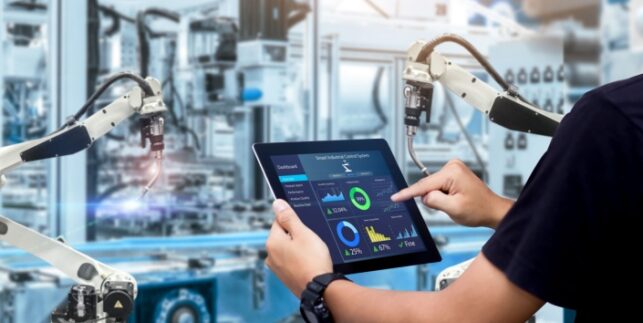Industry 4.0 Alleviates Labor Shortage

As the ongoing labor shortage continues to create problems across the manufacturing sector, many manufacturers are now turning to Industry 4.0 best practices as a solution. Industry 4.0 covers a wide range of new technologies that serve to reduce labor requirements, improve productivity, and make more efficient use of an existing workforce. Manufacturers are already taking advantage of these benefits to alleviate manufacturing labor shortage concerns today.
Eliminating Manual Data Collection
One of the most direct ways that Industry 4.0 technology helps reduce labor requirements is by eliminating manual data collection and handling. Increased connectivity, IoT technology, and the integration of legacy machines and systems into modern solutions all contribute to eliminating manual data collection.
Before these technologies, collecting data on process parameters, production progress, quality, and other areas required additional labor. If you needed to know what was happening at some specific part of your process, you had to send a production team member to a particular location, have them read gauges or sensors, write down the information, and bring it back.
While many parameters could be fed to an MES solution for access through a centralized location, not all could be. Significant compatibility challenges between different sensors, machines, and solutions meant that there was always a need for manual data collection.
Industry 4.0 solutions make it possible to collect data from any source. The combination of hardware, software, and networking technology available lets manufacturers implement remote data collection even with legacy machines and systems. This cuts out a significant set of time-intensive, low-value labor requirements on your factory floor.
Consolidating Production Data in a Single Platform
Even with wholly automated data collection, there is still the challenge of accessing that data and deriving useful information from it. In many manufacturing operations, production data is split between multiple systems and databases, often in entirely incompatible formats.
This requires anyone accessing the data to have specific knowledge of its whereabouts within systems and applications, how to access it, and how to read it. Such an operation faces a significant bottleneck when any stakeholder without that knowledge needs access to production data.
Industry 4.0 solutions allow for the complete integration of production data from all sources into a single platform. Production team members don’t spend time navigating numerous applications and spreadsheets but instead have the information they need in a format they can understand intuitively.
This centralization of production data also enables secure and reliable remote access through cloud solutions. Manufacturers can significantly reduce time spent looking for and managing data, along with allowing hybrid work operations in specific roles.
Streamlining Factory Floor Communications
Manufacturers can alleviate labor shortage challenges by making more efficient use of their existing workforce. One of the most prominent barriers to that efficiency is ineffective communication. Many operations rely on communication methods that allow messages to be overlooked, are difficult or impossible to retrieve, and provide no valuable context.
Industry 4.0 best practice instead focuses on consolidating communications within the same overarching production platform that handles production data. Having everything in one place ensures that production teams don’t overlook messages and that they always know the proper method to use.
This kind of integrated communication also ensures that relevant context is always available. Communications centered around specific events, processes, or machines are linked to those topics, allowing for easy retrieval of all work history. Removing ambiguity and inefficiency from communications gives your production team more time to focus on valuable tasks.
Automating Production Monitoring
Monitoring production is absolutely vital in any manufacturing operation. However, manufacturers don’t want to commit significant labor resources to this kind of task. Manufacturers have already automated manufacturing to some degree with alarms tied to crucial process parameters, but Industry 4.0 technology has reached a new level.
The right Industry 4.0 solution can automate essentially every aspect of production monitoring. The system collects every element of production data in real-time and carries out the necessary analysis to evaluate a wide range of KPIs.
When any KPIs drift from their targets, the system can provide automated alerts to the correct personnel to take action, along with providing the context they need. This means reduced labor requirements for monitoring even complex manufacturing operations.
Reducing Setup Times
In many production operations, there are only so many opportunities to reduce labor requirements. The limiting factor in production may be machine or equipment availability, and no further reduction is possible throughout the majority of the production process.
In these cases, targeting the most directly labor-intensive parts of the production process can be the most effective option. Setup and other product or equipment changeovers are areas where taking a new approach supported by an Industry 4.0 solution can have a significant impact.
With an Industry 4.0 solution, you can seamlessly tie together production, inventory, and sales to streamline scheduling and setup. Determining the next work order to process is automated, and your production team receives clear instructions to choose the correct raw materials, equipment, settings, and other details. This cuts out time spent analyzing work order schedules and setup documentation.
Achieving Efficient Maintenance
Skilled technicians are among the most challenging roles to fill during the ongoing labor shortage. Maintenance is vital to any manufacturing operation and can present a limiting factor to production if a manufacturer doesn’t have the personnel they need to manage it effectively.
Industry 4.0 technology can make maintenance more efficient, letting manufacturers make the most of their limited resources. The right solution can analyze production data to enable predictive maintenance. Changes in process parameters and product quality provide insight into when machines require maintenance or replacement for consumable components.
This predictive maintenance lets manufacturers avoid unplanned stops that increase skilled labor requirements. Instead, they can roll additional maintenance into planned stops to more efficiently use available resources.
Identifying Events Before They Happen
Industry 4.0 technologies include a wide range of advanced computing methods. Within manufacturing, one of the most important is statistical process control (SPC). SPC can reduce the need for production team intervention in processes, which in turn reduces labor requirements.
SPC relies on advanced software that analyzes your production data continuously and historically. From this data, the software draws connections that no human analysis could provide. This enables the prediction of future process upsets based on current parameters long before conventional means can identify a problem.
SPC brings these issues to the attention of your production team, allowing them to take immediate corrective action. Identifying the problem early on minimizes the extent of the required intervention. Your team spends less time dealing with process upsets, reducing your operation’s overall labor requirements.
Putting Industry 4.0 Best Practices to Work on Your Factory Floor
Implementing Industry 4.0 best practices can help your organization make more efficient use of existing resources and alleviate the impact of the ongoing labor shortage. However, you need the right solution to deliver those benefits.
Matics Real-time Operational Intelligence (RtOI) can enable Industry 4.0 best practices on your factory floor. Real-time data aggregation and analysis and the tools to act on that insight let your production have the greatest possible impact. Find out more about what our solution has to offer by booking your demo today.





